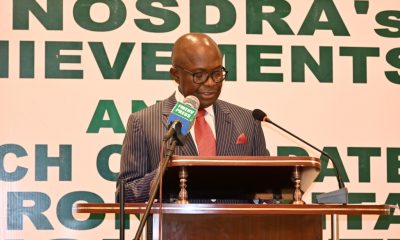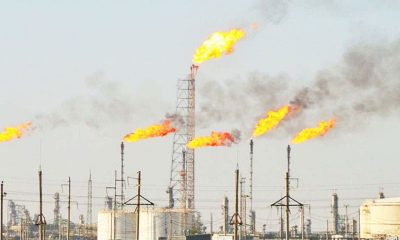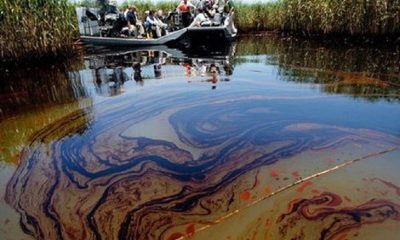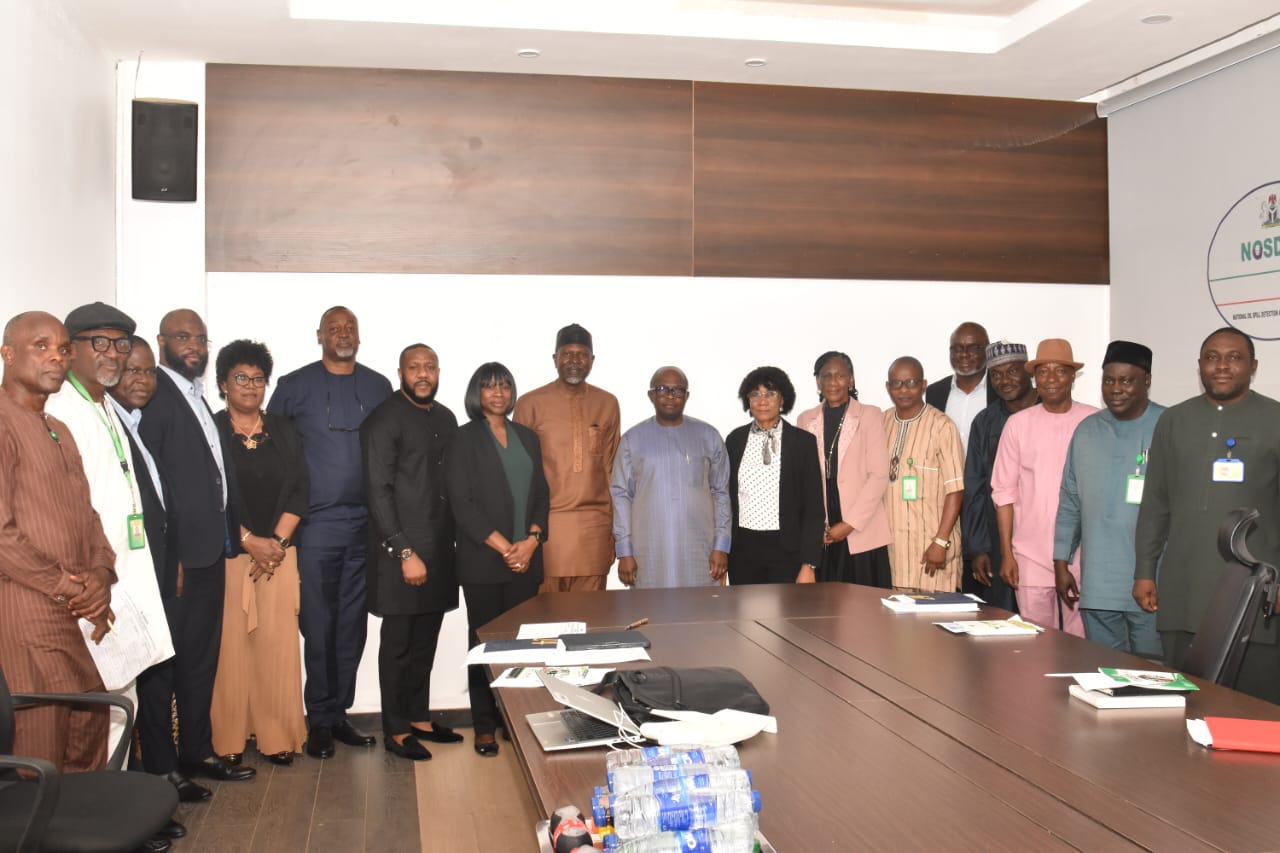Economy
Nigeria’s Response to Oil Spills Poor—NNRC
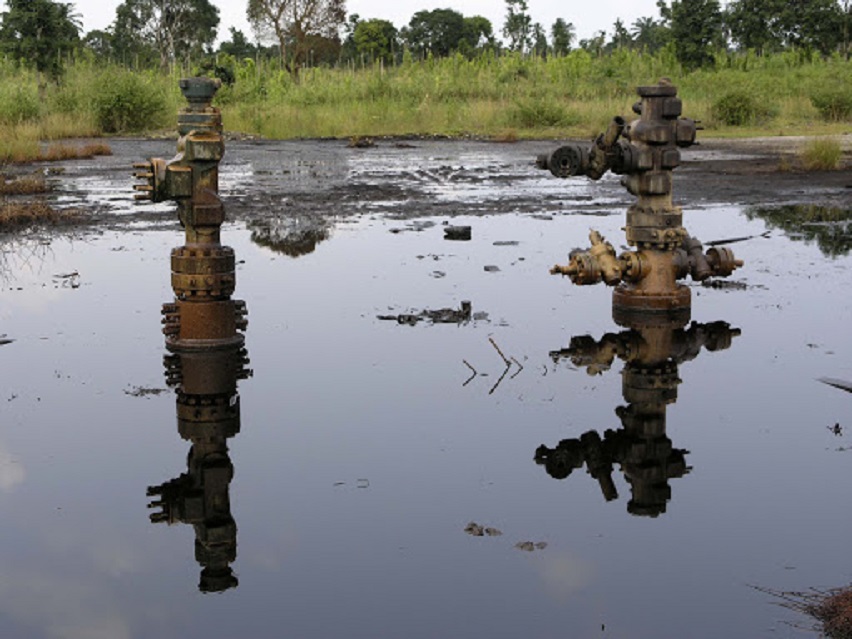
By Adedapo Adesanya
The Nigeria Natural Resource Charter (NNRC) has disclosed that Nigeria is currently suffering from poor response to oil spill and lack of capacity of government’s agencies to tackle environmental issues.
The NNRC said this in a presentation by its Program Coordinator, Ms Tengi George-Ikoli, at a webinar titled Nigerian Oil Spill Detection and Response Agency (NOSDRA) Amendment Bill: Reducing environmental degradation through improved oil spill response.
According to Ms George-Ikoli, NOSDRA, the agency set up to address some of the grave consequences of oil exploitation, which is also mandated to respond to oil spills, was currently hampered by an almost debilitating lack of capacity.
She further stated that there is currently poor response to oil spills because of NOSDRA’s lack of capacity, adding, however, that the capacity gaps in NOSDRA were not due to a lack of expertise but lack of funding and punitive powers.
Ms George-Ikoli lamented that oil exploitation had always presented a huge negative impact on the ecosystem of the Niger Delta region, giving rise to intense land degradation, rapid agricultural decline, fisheries depletion, rampant and destructive oil spillages, continuous gas flaring and toxic water contamination among others.
This, she added, had negatively affected the health, environment and livelihoods of the Niger Delta people.
In her words, “Oil exploitation is now ongoing in the Lagos-Badagry region and now we have discoveries in the Northern part of Nigeria. All over Nigeria, oil exploitation grows, but we must note that as the benefits grow, the resultant negative externalities grow as well.
“The oil age like the coal age and the stone age will at some point set. States that contributed to the coal age in Nigeria are now left to their devices with the shift to oil. What happens to the Niger Delta region with the shift towards alternative energy sources or to other regions in Nigeria where oil is being exploited? The Niger Delta will be left with its diminished livelihoods, health and environment.
“This is no longer theoretical, as we saw with the COVID-19 health crisis that swept the globe. The Niger Delta concerns were not as high on the priority list. This is the reality that the Niger Delta will face with the zero oil scenario.
“In April 2010, the entire world watched in awe as the 4.9 million barrels of oil spilled into the Gulf of Mexico after an explosion on BP’s Deep-water Horizon drilling rig unfolded. The seriousness of the issue was underlined with the numerous visits of the former United States President, Barack Obama and Congressmen to the spill sites.
“In less than two months after the spill, the American government was able to extract a huge sum of $20 billion from the spiller to mitigate the immediate impact of the spill on the environment.
“However, there were spirited efforts to clean the environment and stronger indications that the $20 billion may only be a preliminary appeasement. What would be and what has been the computation of the penalties for similar spills in Nigeria? Will NOSDRA be able to address similar large scale spills effectively?”
She further called for the speedy passage and assent to the reviewed NOSDRA amendment bill, stating that the bill would ensure that NOSDRA was well equipped to tackle all tiers of oil spillages in the Nigerian environment in line with global best practices.
“As we seek to understand the NOSDRA Amendment bill, President concerns, the address of those concerns, we will encourage the government to collaboratively resolve any outstanding issues to ensure the interests of the Niger Delta people and all other exploited regions are protected,” Ms George-Ikoli appealed.
On his part, Mr Sam Kabari, a Lecturer in Environmental Management and Pollution Control, Nigeria Maritime University, Okerenkoko, Delta State, stated that the country needed a NOSDRA which functions as an environmental regulator in the issuance of guidelines and standards and able to address all manner of spills, noting that at the moment, NOSDRA can only detect oil spills but cannot respond.
He further stated that at present, NOSDRA lacked powers to respond to Tier 3 spills, which is between 250 barrels onshore and 2,500 barrels offshore; was dependent on oil companies for logistics, among others.
Mr Kabari said: “As a nation completely dependent on oil and gas, we need an environmental management umpire. The current regulatory framework restricts NOSDRA from achieving that function. The NOSDRA Amendment Bill will empower NOSDRA to respond to all manners of spills within Nigeria. We have to empower NOSDRA now, or live with pollution even after oil.”
Economy
M-KOPA Nigeria Plans Expansion to Edo, Others After N231bn Credit Milestone

By Adedapo Adesanya
Emerging market fintech firm, M-KOPA, has announced plans to deepen its reach in Nigeria to the South South and South East regions, starting with Edo this year, after providing N231 billion in credit to over 1 million customers in the country.
The firm released its first Nigeria-focused Impact Report, which showed that Nigeria is M-KOPA’s fastest-growing market and fastest to reach the milestone.
Since its foray into the Nigerian market in 2019, M-KOPA has been working to dismantle barriers to financial inclusion by providing flexible smartphone financing and digital financial tools that align with how people in the informal economy earn and manage their money.
It operates in six states in the country, including Lagos, Ogun, and Oyo, among others.
The report highlights the company’s contribution to income generation, digital inclusion and economic opportunity for Every Day Earners across the country.
The report showed that M-KOPA has enabled 290,000 first-time smartphone users, while 56 per cent of agents accessed their first income opportunity through the platform.
It showed high income and livelihood gains among its users, with about 77 per cent of customers leveraging smartphones or digital loans obtained through the platform to generate income, indicating that access to financed devices is directly supporting micro-entrepreneurial activity and informal sector productivity.
Furthermore, 75 per cent of users report higher earnings since gaining access to M-KOPA’s services, suggesting measurable improvements in personal revenue streams. On the distribution side, 99 per cent of agents disclose increased earnings, reflecting positive spillover effects across the company’s value chain.
In addition, 81 per cent of long-term customers state that their household expenses have improved, pointing to enhanced financial stability and better consumption smoothing over time.
Speaking on the report, Mr Babajide Duroshola, General Manager, M-KOPA Nigeria, said, “Nigeria represents extraordinary potential, and we’re proud that it has become M-KOPA’s fastest-growing market. Our Impact Report shows that when Every Day Earners gain access to the right digital and financial tools, they use them to create stability and long-term progress for their families. This is about access that unlocks opportunity and sustained prosperity.”
On its expansion plans Nigeria-wide, the M-KOPA helmsman said, “Many of the states we are considering are already similar to the ones we are currently in proximity… So, there is proximity and similarity between these states, and that’s what we are going to do, starting with Edo.”
He noted that as M-KOPA Nigeria continues to expand, the focus remains on ensuring more everyday earners gain access to the digital and financial tools they need to build resilient, prosperous futures in Nigeria’s rapidly digitising economy.
Economy
Tinubu Okays Extension of Ban on Raw Shea Nut Export by One Year

By Aduragbemi Omiyale
The ban on the export of raw shea nuts from Nigeria has been extended by one year by President Bola Tinubu.
A statement from the Special Adviser to the President on Information and Strategy, Mr Bayo Onanuga, on Wednesday disclosed that the ban is now till February 25, 2027.
It was emphasised that this decision underscores the administration’s commitment to advancing industrial development, strengthening domestic value addition, and supporting the objectives of the Renewed Hope Agenda.
The ban aims to deepen processing capacity within Nigeria, enhance livelihoods in shea-producing communities, and promote the growth of Nigerian exports anchored on value-added products, the statement noted.
To further these objectives, President Tinubu has authorised the two Ministers of the Federal Ministry of Industry, Trade and Investment, and the Presidential Food Security Coordination Unit (PFSCU), to coordinate the implementation of a unified, evidence-based national framework that aligns industrialisation, trade, and investment priorities across the shea nut value chain.
He also approved the adoption of an export framework established by the Nigerian Commodity Exchange (NCX) and the withdrawal of all waivers allowing the direct export of raw shea nuts.
The President directed that any excess supply of raw shea nuts should be exported exclusively through the NCX framework, in accordance with the approved guidelines.
Additionally, he directed the Federal Ministry of Finance to provide access to a dedicated NESS Support Window to enable the Federal Ministry of Industry, Trade and Investment to pilot a Livelihood Finance Mechanism to strengthen production and processing capacity.
Shea nuts, the oil-rich fruits from the shea tree common in the Savanna belt of Nigeria, are the raw material for shea butter, renowned for its moisturising, anti-inflammatory, and antioxidant properties. The extracted butter is a principal ingredient in cosmetics for skin and hair, as well as in edible cooking oil. The Federal Government encourages processing shea nuts into butter locally, as butter fetches between 10 and 20 times the price of the raw nuts.
The federal government said it remains committed to policies that promote inclusive growth, local manufacturing and position Nigeria as a competitive participant in global agricultural value chains.
Economy
NASD Bourse Rebounds as Unlisted Security Index Rises 1.27%

By Adedapo Adesanya
The NASD Over-the-Counter (OTC) Securities Exchange expanded for the first session this week by 1.27 per cent on Wednesday, February 25.
This lifted the NASD Unlisted Security Index (NSI) above 4,000 points, with a 50.45-point addition to close at 4,025.25 points compared with the previous day’s 3,974.80 points, as the market capitalisation added N30.19 billion to close at N2.408 trillion versus Tuesday’s N2.378 trillion.
At the trading session, FrieslandCampina Wamco Nigeria Plc grew by N5.00 to trade at N100.00 per share compared with the previous day’s N95.00 per share, Central Securities Clearing System (CSCS) Plc improved by N4.18 to sell at N70.00 per unit versus N65.82 per unit, and First Trust Mortgage Bank Plc increased by 14 Kobo to trade at N1.59 per share compared with the previous day’s N1.45 per share.
However, the share price of Geo-Fluids Plc depreciated by 27 Kobo at midweek to close at N3.27 per unit, in contrast to the N3.30 per unit it was transacted a day earlier.
At the midweek session, the volume of securities went down by 25.3 per cent to 8.7 million units from 11.6 million units, the value of securities decreased by 92.5 per cent to N80.7 million from N1.2 billion, and the number of deals slipped by 33.3 per cent to 32 deals from the preceding session’s 48 deals.
At the close of business, CSCS Plc remained the most traded stock by value on a year-to-date basis with 34.1 million units exchanged for N2.0 billion, trailed by Okitipupa Plc with 6.3 million units traded for N1.1 billion, and Geo-Fluids Plc with 122.0 million units valued at N478.0 million.
Resourcery Plc ended the trading session as the most traded stock by volume on a year-to-date basis with 1.05 billion units valued at N408.7 million, followed by Geo-Fluids Plc with 122.0 million units sold for N478.0 million, and CSCS Plc with 34.1 million units worth N2.0 billion.
-

 Feature/OPED6 years ago
Feature/OPED6 years agoDavos was Different this year
-
Travel/Tourism10 years ago
Lagos Seals Western Lodge Hotel In Ikorodu
-

 Showbiz3 years ago
Showbiz3 years agoEstranged Lover Releases Videos of Empress Njamah Bathing
-

 Banking8 years ago
Banking8 years agoSort Codes of GTBank Branches in Nigeria
-

 Economy3 years ago
Economy3 years agoSubsidy Removal: CNG at N130 Per Litre Cheaper Than Petrol—IPMAN
-

 Banking3 years ago
Banking3 years agoSort Codes of UBA Branches in Nigeria
-

 Banking3 years ago
Banking3 years agoFirst Bank Announces Planned Downtime
-

 Sports3 years ago
Sports3 years agoHighest Paid Nigerian Footballer – How Much Do Nigerian Footballers Earn


